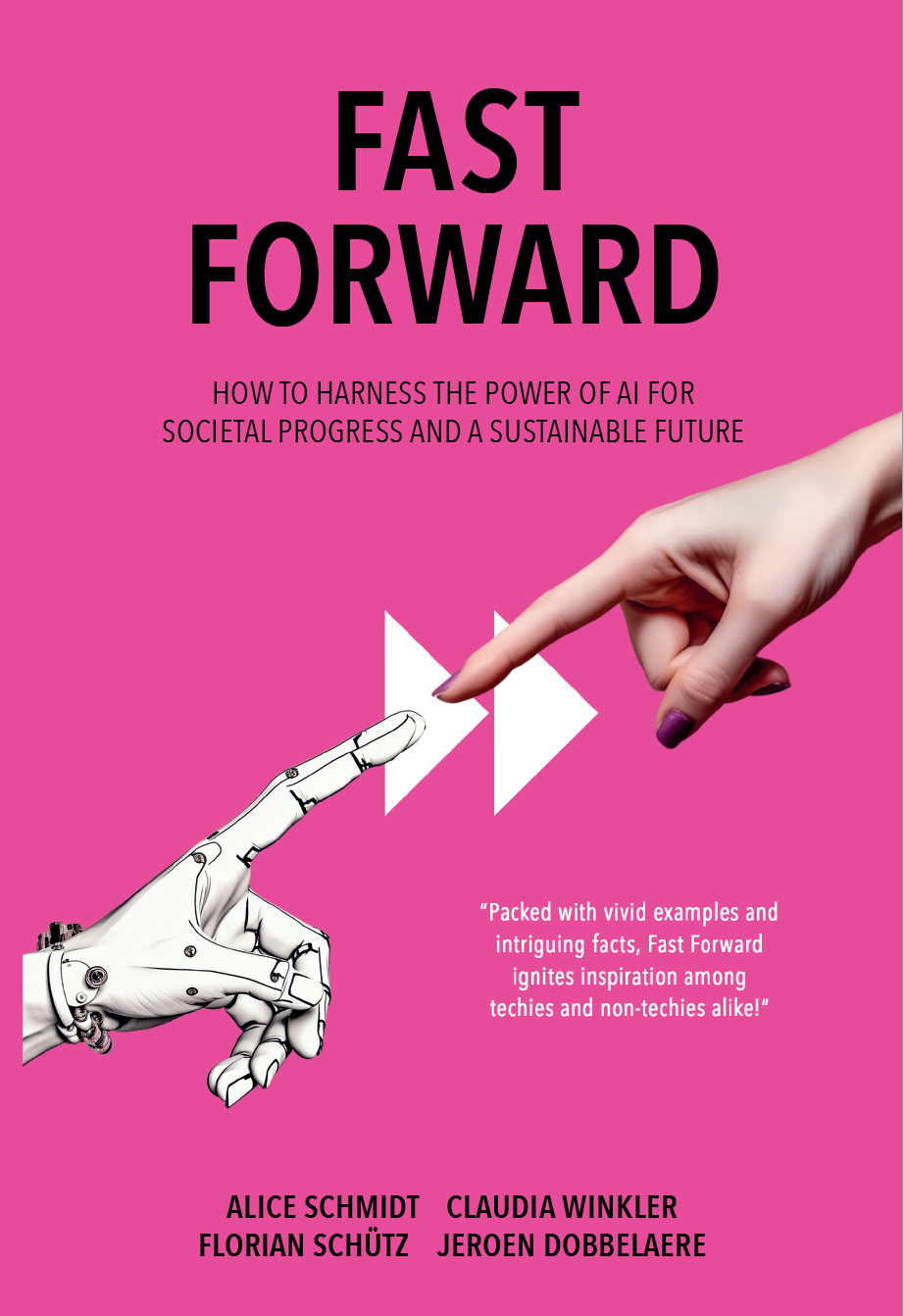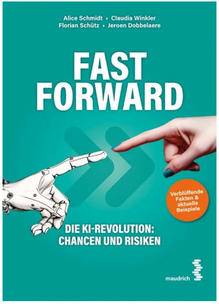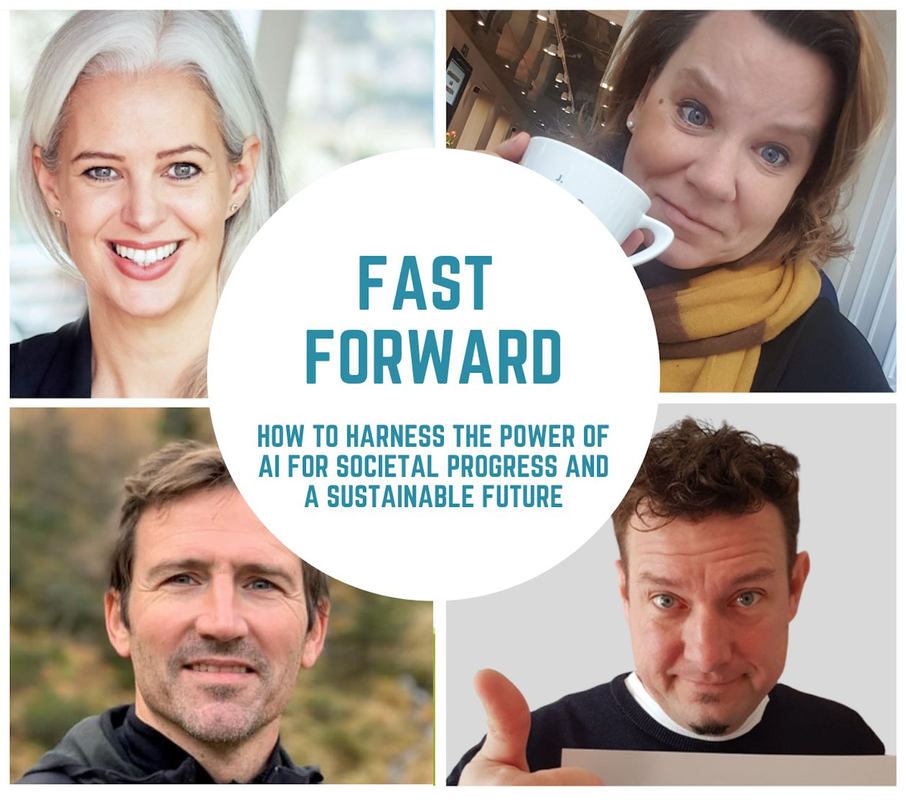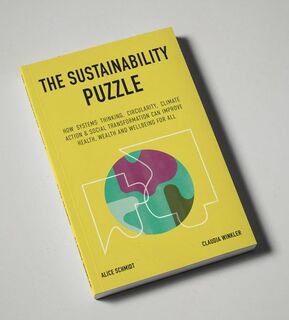How to harness AI for a better future?
We are in the midst of a watershed moment regarding the need for sustainable transformation. Technology, and artificial intelligence in particular, can prove pivotal in our efforts to solve the sustainability puzzle. However, there is a significant gap between the sustainability and tech sectors, resulting in inefficiencies, missed opportunities and escalating risks for both people and the planet. Aligning these sectors’ goals and impact measures is the key to a sustainable future for all of us.
Authored by a diverse team of experts – global sustainability specialist Alice Schmidt, the impact-driven entrepreneur Claudia Winkler, AI expert Florian Schuetz and the life scientist Jeroen Dobbelaere – Fast Forward bridges the divide between sustainability and technology while tackling the important questions posed by individuals, organisations and societies worldwide since ChatGPT’s public release. Offering a variety of current real-life examples, the authors make a compelling case for the imperative of ethical and responsible AI. They highlight how these principles are instrumental in harnessing AI’s transformative capacity to revolutionize our approach to sustainability and create health, wealth, and well-being for all. |
|
AI: Friend or Foe? The 2024 German language version of Fast Forward was published by maudrich/facultas. It contains many fascinating facts about both risks and opportunities of artificial intelligence for society, including in the world of work, social inclusion, environmental action, education, science and even military power.
|
"A truly fascinating book that will make many aware of the crossroads our society is facing! Fast Forward is different from other books on AI and leadership, which tend to be highly polarizing: the authors have done an excellent job of shedding light on various aspects of AI, allowing readers to quickly grasp the benefits and potential applications while keeping the challenges in mind." Dr. Barbara Stöttinger, Email
"I would recommend this book to anyone even remotely interested in artificial intelligence, regardless of their previous knowledge on the subject. It is a thought-provoking read that raises a lot of questions and accentuates the interdisciplinary implications of AI." Mariana Di-Bella, Amazon
"A fascinating book! „Fast Forward“ is a timely and indispensable read for anyone interested in the future of technology and what this means for society. I love the personal anecdotes." Michaela Heinrich-Bogensberger, Amazon
"I really liked the book. Tons of great insights." Frank Kumli, LinkedIn
"This is an essential read for leaders across sectors, students and anyone seeking to understand the possibilities and potential pitfalls of AI. It is a brilliant book to help us all understand AI, work together and co-create a positive future." John F. Kennedy, Amazon
Fast Forward takes you on a captivating exploration of AI, unveiling its untapped potential and hidden risks in shaping sustainable transformation. From work and education to science, ecology and social justice, the book delves into key areas of risk and opportunity. It critically assesses the role of big tech and other influential players, while shedding light on the impacts of AI on warfare, misinformation campaigns and other risks to democracy.
Packed with vivid examples and intriguing facts, Fast Forward ignites inspiration among techies and non-techies alike. It serves as a timely reminder that each of us has a stake in and the ability to shape a regenerative, sustainable and resilient future.
Packed with vivid examples and intriguing facts, Fast Forward ignites inspiration among techies and non-techies alike. It serves as a timely reminder that each of us has a stake in and the ability to shape a regenerative, sustainable and resilient future.
Fast Forward with AI: What you can do to maximise positive impact
Fast Forward zooms in on the technology piece of the sustainability puzzle, discussing the risks and opportunities of AI in creating a world that's socially just and environmentally sustainable, ultimately maximising health, wealth and wellbeing for all. The book is structured as follows:
Key insights
- AI: friend or foe?
- Background, basics and Bladerunner
- A magic bullet for social justice?
- The future of work
- Too cool for school - AI in education and science
- Do look up - AI's complicated relationship with nature
- Ethics, failure and responsibility
- Politics, power and peace
- Shaping a meaningful future
Key insights
- AI is no longer a niche topic, but a critical issue that affects us all.
- The AI and sustainability agendas - largely disconnected today - must be aligned and integrated NOW.
- We must not leave AI solely to techies. People from all disciplines and all walks of life need to get involved.
- Good intentions do not always lead to good results. Some AI "solutions" can do more harm than good.
- Both AI doomsters and AI optimists have valid concerns.
- A sustainable future is one where digitalisation serves people and the planet, rather than being employed for its own sake.
- We must invest much more in tracking societal impacts of AI.
- Respecting key principles of ethical and responsible AI, e.g. transparency, fairness and accountability, is an essential starting point.
- New forms of collaboration and regulation are needed to counteract AI's potential to accelerate cybercrime, misinformation, warfare and a further polarisation of power.
- Creating a net benefit with AI for equity, employment, education and ecology is possible - but only if we act wisely and swiftly.
About the authorsCollaboration is key to making sustainability and regeneration a reality. As pragmatic thinkers and doers, Alice Schmidt and Claudia Winkler have teamed up again, also bringing in AI expert Florian Schütz and life scientist Jeroen Dobbelaere. Drawing on their combined 100 years of experience in sustainable development, ethical technology, social innovation, the circular economy and responsible business, they discuss how to harness the power of AI for societal progress and a sustainable transformation.
|
Alice SchmidtAlice Schmidt is a leading sustainability advisor, business consultant and keynote speaker who helps her clients and collaborators untangle sustainable transformation and regeneration (www.aliceschmidt.at). A bigger-picture thinker, Alice has spent over 25 years addressing social, environmental and economic sustainability in a global context. She has worked with 70 of the world’s best organisations, from the United Nations and the European Commission to NGOs, corporations and small social enterprises in 30+ countries. Alice is a senior lecturer at Vienna University of Economics and Business among others, and she carries the sustainability flag as a member of various sustainability boards. She is passionate about designing for impact and creating tangible, measurable results for people and the planet. Together with Claudia Winkler, Alice wrote “The Sustainability Puzzle".
Jeroen Dobbelaere
Jeroen Dobbelaere is a cell biologist and sustainability manager helping to make academia fit for a sustainable future. Having done lab-based work for more than 20 years at UGent, ETH Zürich, Cambridge University and the University of Vienna he knows the ins and outs of academic work. Hehas published many scientific papers in high-ranking journals and is well familiar with the international conference circuit. As a vivid gardener and lover of the outdoors, Jeroen always tries to look at research through the
lens of environmental sustainability. He founded the grassroots group Climate@MaxPerutzLabs in Vienna, published several papers on the need for a sustainable transformation in academia and developed several courses and teaching tools. Not waiting for academia to change, Jeroen decided to take a break from research and is now creating impact as sustainability manager at the Institute of Science and Technology Austria (ISTA). |
Claudia Winkler
Claudia Winkler is an internationally recognised, award-winning impact innovator, entrepreneur, and serial founder. She has a 20-year executive background in the ICT industry and experience serving on the supervisory board of leading Central and Eastern European telecommunication companies. Her mission is rooted in shaping a meaningful and prosperous future for all. As part of this mission, Claudia successfully launched the first B-Corp certified telecommunication company in Europe. Passionate about developing digital products and services, Claudia utilises her extensive knowledge of digitalisation to transform traditional business models to help creating a sustainable future. Alongside Alice Schmidt, she co-authored “The Sustainability Puzzle” and actively shares her findings as a keynote speaker and advisor on sustainability, innovation and digitalisation worldwide.
Florian Schütz
Florian Schütz is an accomplished entrepreneur and seasoned senior transformer, excelling in driving digital transformation and embracing emerging technologies. He pioneered the use of AI for social media monitoring in Europe and successfully integrated his company into the operations of a leading global market research organization a decade ago. Florian’s expertise spans technology, multimedia, and artificial intelligence, and he has a deep passion for analyzing the latest tech developments. Combining his technical prowess with art, Florian has embarked on a new endeavor, enriching his artwork with AI. His pieces are characterized by intellectual clarity, conceptual order, and thought-provoking messages. Florian’s art often conveys political statements, employing text fragments, typography, and composition to create an enigmatic and engaging experience. Explore Florian’s works at www.floschuetz.com.
|
Other publications
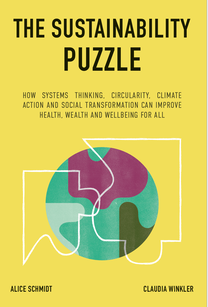
- Schmidt, A. (2024). "Wie eine Zukunft mit KI gelingen kann", in facultas Wissen Spezial 2024. Link
- Borgermann, N., Schmidt, A. and Dobbelaere, J. (2022). Preaching water while drinking wine: Why universities must boost climate action now. One Eartch Commentary I Volume 5, ISSUE 1, P18-21, 22 January 2022; https://www.sciencedirect.com/science/article/pii/S2590332221007338?dgcid=author
- Schmidt, A. and Winkler, C. (2021). The Sustainability Puzzle: How Systems Thinking, Circularity, Climate Action and Social Transformation Can Improve Health, Wealth and Wellbeing for All. http://www.sustainability-puzzle.org
- Schmidt A. (2021) Health and the City: How Cities Impact on Health, Happiness, and Well-Being. In: Brears R. (eds) The Palgrave Encyclopedia of Urban and Regional Futures. Palgrave Macmillan, Cham. https://doi.org/10.1007/978-3-030-51812-7_170-1
- Schmidt, A. and Winkler, C. (2021). Piecing together The Sustainability Puzzle: How an ambitious book was born. One Earth Backstory | Volume 4, ISSUE 10, P1339-1347, October 22, 2021; https://www.cell.com/one-earth/fulltext/S2590-3322(21)00529-7
- Schmidt, A. (2021). "Creating Win-Wins by Taking Drastic Action on Sustainability", online: www.thedefencehorizon.org/post/creating-win-wins-by-taking-drastic-action-on-sustainability
- Winkler, C. (2021). "Wie Non- Profits und Impact Startups zusammen die Gesellschaft verändern können", online: www.techandnature.com/wie-non-profits-und-impact-startups-zusammen-die-gesellschaft-verandern-konnen/
- Schmidt, A. (2020). "50 Opportunities for a Better World". B4 Magazine, issue 62, June 2020, pp. 52 - 55, online: https://issuu.com/b4-business/docs/b462-as-consulting; PDF
- Reschke, J., Winkler C. (2020). "Trends und Ausblick: Was heute und morgen das digitale Fundraising verändert" in Online-Fundraising, Springer Fachmedien Wiesbaden
- Winkler, C. (2020). "5 Gründe warum Unternehmen jetzt auf Nachhaltigkeit setzen sollten", online: www.techandnature.com/5-grunde-warum-unternehmen-jetzt-auf-nachhaltigkeit-setzen-sollten/
- Winkler, C. (2020). "Doughnut Economics- a gamechanging concept on how to create regenerative economies by design" online: theglobal.school/doughnut-economics/
- Winkler, C. (2020). "5 Start-Up Methoden für mehr Nachhaltigkeit", online: www.techandnature.com/startup-methoden-nachhaltigkeit/
- Gradl, C., Schmidt, A. et al. (2019) "Inclusive Business: Make or Buy? Corporate Impact Venturing at the Base of the Pyramid", Endeva. PDF
- Schmidt, A. et al. (2019). "The Use of ICT Solutions in Inclusive Value Chains", Endeva/Fundes. PDF
- UNIDO (2015). “Guide on Gender Mainstreaming of Business, Investment and Technology Services for Private Sector Development”. PDF
- Schmidt, A. (2013). “Glück und Politik: Wie uns die Politik (nicht) glücklich machen kann - Das BIP und seine Alternativen zur Messung von gesellschaftlichem Wohlbefinden und Fortschritt”; Happiness Observer 4-6/2013.
- Schmidt, A. (2013). “Good Practice Guidelines: Partnering for Effective Mining Health Programming”. Mining Health Initiative. PDF
- Schmidt, A. (2013). “Mining Health Programs in Papua New Guinea: Lessons Learned to Inform Good Practice”. Mining Health Initiative. PDF
- Schmidt, A. and Woods, N. (2013). “Newmont Ghana’s Akyem Mine: Lessons Learned in Partnership and Process; Mining Health Initiative Case Study”. PDF
- Schmidt, A. and Timmermans, N. (2013). “Rio Tinto (QMM) and its health programme in Madagascar: Lessons Learned in Partnership and Process; Mining Health Initiative Case Study”. PDF
- Schmidt, A. (2013). “Education: Harnessing School-Based Programmes to Improve Health Outcomes”. Oxford Policy Management/Partnership for Maternal, Neonatal and Child Health. PDF
- Schmidt, A. and Mecaskey, J. “Mining Health Partnerships: A short analytic framework”; Mining Health Initiative. PDF
- Schmidt, A. and Mecaskey, J. (2012). “An analysis of what is known about Mining Industry Health Programmes”; Key literature findings update, Mining Health Initiative. PDF
- Schmidt, A. (2011). “Progress and status quo of democratic ownership: aid effectiveness in El Salvador, Nepal and Mozambique”; Action for Global Health. PDF
- McPake, B., Brikci, N., Cometto, G., Schmidt, A. and Araujo, E. (2011). “Removing user fees: learning from international experience to support the process”; Health Policy and Planning. PDF
- Brown, R. and Schmidt, A. (2011). “Global Guide to CMAM (Community Management of Acute Malnutrition) Integration”; Action Contre la Faim/Action Against Hunger International (forthcoming)
- Schmidt, A. (2010). “Corporate Social Responsibility in Austria”; Chapter in the ‘World Guide to Corporate Social Responsibility’, edited by W. Visser and N. Tolhurst (2010). View
- Schmidt, A. (2009). “The Underfunding of TB Research Across Europe”; Médecins Sans Frontières. PDF
- Schmidt, A. (2009). “Aid Effectiveness in Nepal”; Action for Global Health. PDF
- McPake, B., Schmidt, A., Araujo, E. (2008). “Freeing Up Healthcare – a guide to removing health user fees”; Save the Children UK. PDF
- Berkhout, E. et al. (2008). “Health insurance in low-income countries – where is the evidence that it works?”; Joint NGO lobby paper. PDF
- Schmidt, A. (2008). “Helping Children Survive – Supporting poor families to overcome barriers to maternal, newborn and child health services”; Save the Children UK. PDF
- Schmidt, A. (2007). “Volunteer Child Soldiers as Reality: A Development Issue for Africa”; New School Economic Review, Vol 2(1), 2007, 49-76. PDF
- Schmidt, A. (2006). “Explaining Voluntary Recruitment of Children as Soldiers in Sub-Saharan Africa: Navigating between Victimisation and Agency of Children to Facilitate Reintegration and Peace”; Master’s thesis: School of Oriental and African Studies, University of London.
- Martin, G. et al (2005). “The Impact of HIV/AIDS on Household Vulnerability and Poverty in Vietnam”; UNDP/Ministry of Health. PDF
- Schmidt, A. (2004). Training Module on Stakeholder Analysis; Advocacy Package: Asian Institute for Development Communication/UNFPA.
- Schmidt, A., de Lind van Wijngaarden, J., Bjarnegard, E. (2003). “HIV/AIDS and Education – A Toolkit for Ministries of Education”; UNESCO Bangkok. PDF
- Schmidt, A. (2001). “Brand Preferences and Brand Knowledge of 3 to 5 year old Children in Australia: An Empirical Survey and Ethical issues in Marketing to Children”; Master’s thesis: Vienna University of Economics and Business.
- Deecke, U., Schmidt, A., Windbichler, J. (2000). “Webcheck 2000 - die bedeutung des internets for österreichs top 500 unternehmen“; diamond:dogs
Short articles & commentary
- Happiness as a key business factor: Creating competitive advantage by addressing happiness and assessing social impact; guest commentary.
- 5 Gründe warum Unternehmen jetzt auf Nachhaltigkeit setzen sollten (in German)
- Glück als Wirtschaftsfaktor / Happiness as a key factor for business (in German).
- Doughnut Economics- a gamechanging concept on how to create regenerative economies by design
- 5 Start-Up Methoden für mehr Nachhaltigkeit (in German)
- Wie Non-Profits und Impact Startups zusammen die Gesellschaft verändern können (in German)
- Interview on defining and researching happiness (in German)
- Article on Politics & Happiness in the Happiness Observer (in German). Read summary here.
- Pressetext.at on 15 June 2012 "CSR in Betrieben: Investoren fordern Nachweis - Social Impact Assessment hilft bei Vergleich von Nachhaltigkeit" (‘Corporate Social Responsibility: Investors Demand Proof - Social Impact Assessment to Facilitate Sustainability Comparisons’)
